|
|
|
|
|
|
|
|
No Arctic science events are scheduled for today.
|
Media
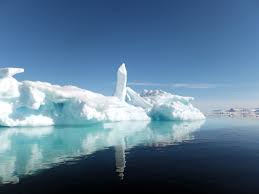 Shrinking Arctic Sea Ice Raises Security Concerns. Shrinking Arctic Sea Ice Raises Security Concerns. Shrinking ice cover is making the Arctic more accessible to various countries, commercial entities and researchers, among others. "While Arctic sea ice continues to shrink, human activity in the region is only growing. Ice extent, which is monitored by the U.S. National Ice Center (USNIC), often determines what types of activities are pursued in the region," says NOAA National Environmental Satellite, Data, and Information Service (NESDIS). MarineLink
Arctic Crab Invasion Comes to Nuclear Water Graveyard. The Soviet Union during the 1960s and 70s dumped several hundred containers with solid radioactive waste in the Blagopoluchie Bay in Novaya Zemlya. Back then, these waters were covered with ice overwhelming parts of the year. Today, that is quickly changing. The bay located in the northern part of the Russian Arctic archipelago is now ice-free increasing parts of the year. With the retreating ice follow new species. The Barents Observer
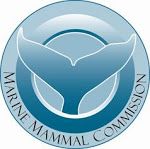 Marine Mammal Commission Announces Fiscal Year 2019 Grant Focal Area: Impacts of a Changing Ocean on Marine Mammals of Importance to Alaska Natives Marine Mammal Commission Announces Fiscal Year 2019 Grant Focal Area: Impacts of a Changing Ocean on Marine Mammals of Importance to Alaska Natives. Maintaining marine mammals as functioning elements of healthy ecosystems and as resources for subsistence needs of Alaska Native communities, requires understanding the role of marine mammals in the ecosystem and how they may be impacted by ongoing changes in the environment and human use of marine areas. Access to accurate and precise information is imperative for sound decision-making, and can be facilitated by co-production of knowledge between scientists and Alaska Native communities. Marine Mammal Commission
Summer Transportation Internship (paid) in Washington, DC. The U.S. Department of Transportation (U.S. DOT) is accepting applications for the 2019 Summer Transportation Internship Program for Diverse Groups (STIPDG). The program provides college/university students with hands-on experience and on-the-job training while working on current transportation-related topics and issues. The STIPDG is open to all qualified applicants but is designed to provide qualified women, persons with disabilities, and members of diverse groups with summer opportunities in transportation. The STIPDG is a paid internship program, from June 3 to August 9, 2019, that is open to all qualified candidates. Successful applicants may be selected by any of the DOT agencies and offices for the summer, including the US Committee on the Marine Transportation System. The program also provides housing but the applicant will have to pay their travel to and from Washington, DC. Applications for the 2019 summer program are being accepted through January 22, 2019. Any successful candidates that have an interest in maritime-related transportation, including those in the Arctic, may contact Helen.Brohl@cmts.govfor more information. Additional details are here: https://www.fhwa.dot.gov/education/stipdg.cfm
|
|
Future Events
DOD Arctic research session at SERDP/ESTCP, Nov. 29, 2018, Washington, DC. An Arctic research focus will be presented at the SERDP-ESTCP annual meeting "Enhancing DoD's Mission Effectiveness." The Strategic Environmental Research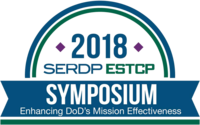 and Development Program (SERDP) and Environmental Security Technology Certification Program (ESTCP) symposium is a nationally recognized conference focusing on DOD's priority environmental and installation energy issues. This year's meeting, at the Washington Hilton Hotel, 1919 Connecticut Ave., NW, Washington, DC 20009, will feature a technical session on Arctic research under the theme of "Resource Conservation and Resiliency." The session is scheduled for Thursday, Nov. 29th, from 8:30 am to 11:30 am, and will include the following speakers: Andrew Nelson (USACE), John Farrell (USARC), Martin Jeffries (USACE/CRREL), John Woods (ONR-RC), Kevin Bjella (USARC/CRREL), and Hajo Eicken (UAF/IARC). and Development Program (SERDP) and Environmental Security Technology Certification Program (ESTCP) symposium is a nationally recognized conference focusing on DOD's priority environmental and installation energy issues. This year's meeting, at the Washington Hilton Hotel, 1919 Connecticut Ave., NW, Washington, DC 20009, will feature a technical session on Arctic research under the theme of "Resource Conservation and Resiliency." The session is scheduled for Thursday, Nov. 29th, from 8:30 am to 11:30 am, and will include the following speakers: Andrew Nelson (USACE), John Farrell (USARC), Martin Jeffries (USACE/CRREL), John Woods (ONR-RC), Kevin Bjella (USARC/CRREL), and Hajo Eicken (UAF/IARC).
American Geophysical Union Fall meeting, December 10-14, 2018 (Washington, DC USA). The AGU 2018 Fall Meeting will mark another dynamic year of discovery in Earth and space science, serve as the advent of AGU's Centennial year, and provide a special opportunity to share our science with world  leaders in Washington, D.C. As the largest Earth and space science gathering in the world, the Fall Meeting places you in the center of a global community of scientists drawn from myriad fields of study whose work protects the health and welfare of people worldwide, spurs innovation, and informs decisions that are critical to the sustainability of the Earth.
USARC Commissioner Jacqueline Richter-Menge to deliver the Nye Lecture at the 2018 AGU Fall Meeting. The US Arctic Research Commission (USARC) is pleased to announce that Commissioner Jacqueline Richter-Menge will present this year's Nye Lecture, titled "A Career of Change," at the Fall Meeting of the American Geophysical Union (AGU) in Washington, DC at 2:50 pm on Tuesday, December 11, 2018 in the Marquis room of the Marriott Marquis Hotel, 901 Massachusetts Ave. NW, Washington, DC 20001.
ArcticNet: Annual Scientific Meeting 2018, December 10-14, 2018 (Ottawa, ON Canada). Canada's North is experiencing unprecedented change in its sea and terrestrial ice, permafrost and ecosystems under the triple pressures of climate change, industrialization and modernization. The impacts of these pressures can be seen on food and energy security, shipping, sovereignty, northern community health and well-being, and sustainable development and resource exploitation. All these issues have brought the North to the forefront of national and international agendas. Building on the success of its previous Annual Scientific Meetings and International Arctic Change Conferences, the Arctic Network of Centers of Excellence announces the 14th ArcticNet Annual Scientific Meeting.
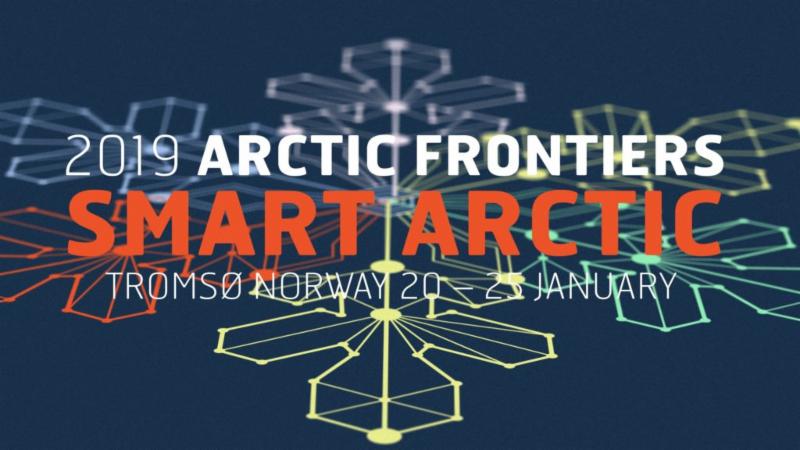 Arctic Frontiers, January 20-25, 2019 (Tromso, Norway). The Arctic Frontiers is a global scientific conference on economic, societal, and environmental sustainable growth. This year's theme will be "Smart Arctic," with a pan-arctic emphasis, and an effort to build new partnerships across nations, generations and ethnic groups. Arctic Frontiers provides a forum for dialogue and communication between science, government and industry. The plenary program will have five main sessions: State of the Arctic, Blue Growth, Smart Solutions, Bridging the Gap, and Arctic business prospects. An abstract-driven science program will address Plastics in the Ocean, the Future of Governance and Handling Vulnerability in Arctic Ecosystems, State of the Arctic and A Smart Arctic Future.
Save the Date! 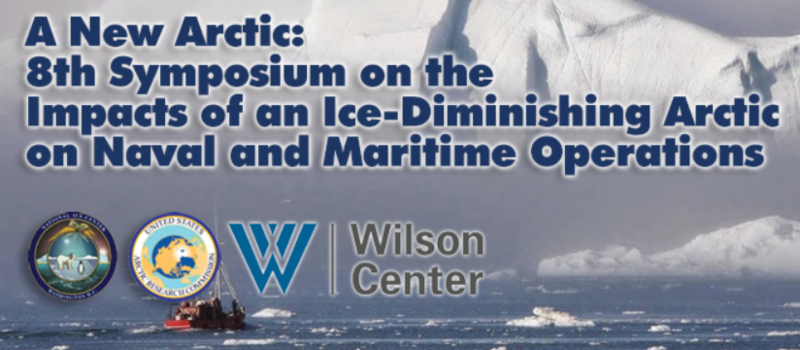
Mark your calendars to attend IDA-8, which some have called one of the best Arctic gatherings around. Historically, this biennial symposium was co-hosted by U.S. National/Naval Ice Center (NIC) and the US Arctic Research Commission (USARC). In 2019, these partners will join forces with the preeminent Wilson Center's Polar Institute, as a third co-host. The now 2-day symposium will be held in the Ronald Reagan Building Amphitheater, in Washington, DC. The event will focus on a broad cross-section of naval and maritime operations and issues in an ice-diminishing Arctic. The symposium brings together nationally and internationally recognized experts on Arctic governance, geopolitics, marine operations, infrastructure, science, and environmental observations, from the local, regional, and pan-Arctic scale. Information on prior symposia, including lists of speakers, video clips, and copies of presentations, is available here. Attendance is free, and registration will begin in Spring 2019. The event will be webcast live, and video recorded.
 of the AAG includes over 8,500 geographers converging from the U.S., Canada, and nearly 60 other countries in a typical year including geographers, GIS specialists, environmental scientists, and other leaders for the latest in research and applications in geography, sustainability, and GIScience. of the AAG includes over 8,500 geographers converging from the U.S., Canada, and nearly 60 other countries in a typical year including geographers, GIS specialists, environmental scientists, and other leaders for the latest in research and applications in geography, sustainability, and GIScience.
|
|

  
4350 N. Fairfax Drive, Suite 510
Arlington, VA 22203, USA
External links in this publication, and on the USARC's World Wide Web site ( www.arctic.gov) do not constitute endorsement by the US Arctic Research Commission of external Web sites or the information, products or services contained therein. For other than authorized activities, the USARC does not exercise any editorial control over the information you may find at these locations. These links are provided consistent with the stated purpose of this newsletter and the USARC Web site.
|
|
|
|
|
|
|
|
|